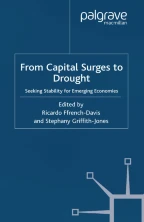
At the beginning of the 1990s the United States experienced a recession, but the US government’s large budget deficit did not allow the use of a discretionary countercyclical fiscal policy to stimulate the economy. With the elimination of budget deficits in recent years, the use of discretionary fiscal policy has re-emerged. In fact, in the face of an economic downturn the United States recently enacted a tax reform that reduced tax rates. Similarly in Chile a law to reduce personal income tax rates has been approved by the government in order to cool aggregate demand and improve efficiency. Both countries have considered expanding their fiscal expenditure to accelerate their economic recovery. Discretionary countercyclical fiscal policy again appears to be a feasible option.
An earlier version of this chapter was presented at a WIDER seminar in Helsinki, Finland, October 2001. I am indebted to Ricardo Ffrench-Davis for his excellent advice on improving the chapter. I am also grateful for the very useful remarks by Guillermo Larraín, Guillermo Le Fort, John Hawkins, Carlos Massad and José Antonio Ocampo. Of course, all remaining errors are my own.
This is a preview of subscription content, log in via an institution to check access.